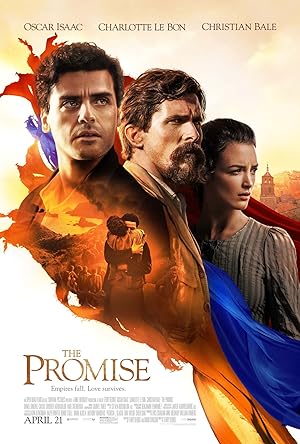If you do not know anything about the Armenian Holocaust or Armenian Genocide, this review is probably not the best way to find out about it, but I’ll do my best to explain. Some consider it the first modern example of a systematic, organized genocide. Before WWII and THE Holocaust, even before WWI, the Ottoman Empire, now the Republic of Turkey, systematically rounded up and killed Armenians either through slavery, oops I mean detention centers, oops I mean labor camps, in preparation for deportation often subject to mass rape, execution, dehydration and starvation. There is no universal international recognition for this atrocity because the Turkish government denies it, and they are a crucial ally for some countries so they don’t seem Islamophobic when fighting Saddam Hussein, the Taliban, ISIS or insert whatever group has decided to be the bad guy for our latest Middle Eastern or Western Asian conflict.
The only reason that I know about it is NOT because I was blessed with an amazing education. Most schools don’t teach about it. It is actually because I have never lived in a community without an Armenian population-New York City and Massachusetts. You can’t forget something that you never knew. If you are wondering what the Kardashians are good for, Kim has consistently used her fame to shine a spotlight on the issue by commemorating the 100th anniversary in 2015. As a result of this systematic avoidance of discussing this atrocity, there are few movies that tackle the subject matter, and they are not easily available: Ararat, Don’t Tell Me the Boy Was Mad, Mother (1991) or 1915. I just found out that The Cut and The Lark Farm are available on Netflix so I will be checking them out at some point.
The Promise was released earlier this year, and it stars Oscar Isaac, everyone’s favorite dancer in Ex Machina, and Christian Bale. If you heard about this movie, it may be because of an unofficial online campaign to rate it at a lower favorable rating before it was released-an honor usually reserved for the books written by mothers of unarmed black people who are victims of extrajudicial executions. Kirk Kerkorian, who actually owned MGM at one point, couldn’t get his own studio to make the film, intended Clark Gable to be the star, and eventually had to solely finance the project. For whatever reason, people don’t want films about the Armenian Holocaust and will do whatever it takes to stop it, which really isn’t necessary considering that the film is uneven and would have stumbled on its own merits.
I always have a problem when film studios instinctually rely on fiction as if history was not innately interesting enough to stand on its own. The Promise decides to make history approachable by taking the old school TV miniseries route and using the Armenian Holocaust as the sweeping backdrop to a story of a forbidden love that can’t be denied and could be stopped by events larger than them. If you dig Doctor Zhivago, you may love it, but it did not work for me. The worst part is that the film wants the audience to think of Isaac’s character as a good guy as he does crappy things to everyone around him and deceives them for their own good. Sure. OK. Seriously if you put yourself in the other character’s shoes, you would be livid with him if he were not Isaac, who is hot and a good actor. The main characters are at best, boring and lifeless and at worst, casually cruel and spectacularly stupid.
When the film sets aside the script and seems to rip pages from history books and throw them on screen, The Promise is riveting. The movie does deliver on communicating the systematic government persecution, the Armenians’ perseverance and dignity in the face of death and the stubborn, practical advocacy of Armenian people’s allies, including the French Navy and the American Ambassador Henry Morgenthau. I have no idea if Turkish allies were treated as brutally as the character in the film. All these stories are incredibly relatable, which makes the whole enterprise more depressing because there ispotential for a good movie if the filmmakers trusted the audience did not need the truth to be sugarcoated with a contrived love story.
Representation matters. The survivors of the Armenian Holocaust deserve a better film than The Promise, but it is a start, and I would rather that a flawed movie exist than no one ever made the movie. I still watch things of questionable quality when I see even a small part of myself on the big or small screen. The only way for the quality to improve is for other filmmakers to know that it is possible to make a film about the subject then have the freedom to revisit and explore it from different angles and try again. I applaud the film’s determination while critiquing America’s first draft at telling an important story. I’m looking forward to the next one while wishing there was not still a need over a hundred years later to fight for its right to exist.
Stay In The Know
Join my mailing list to get updates about recent reviews, upcoming speaking engagements, and film news.





